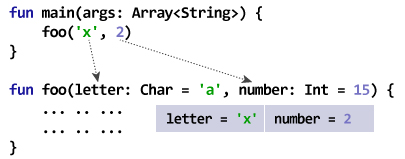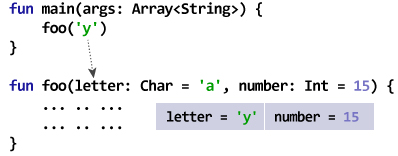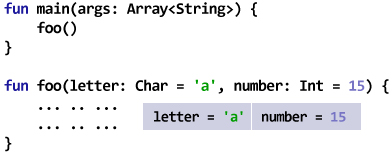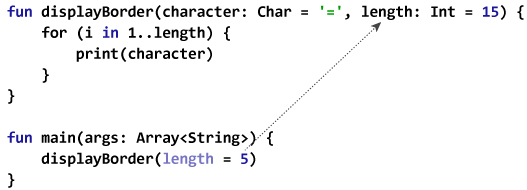Kotlin默认参数
在Kotlin中,您可以为函数定义中的参数提供默认值。
如果通过传递的参数调用该函数,则将这些参数用作参数。但是,如果在不传递参数的情况下调用该函数 ,则会使用默认参数。
默认参数如何工作?
案例一:所有参数通过

函数 foo()有两个参数。参数提供有默认值。但是,通过在上述程序中传递两个参数来调用foo() 。因此,不使用默认参数。
在foo() 函数, 字母和数字的值分别为'x'和2 。
情况二:未传递所有参数

在这里,只有一个(第一个)参数传递给foo() 函数。因此,第一个参数使用传递给函数的值。但是,第二个参数号将采用默认值,因为在函数调用期间未传递第二个参数。
在foo() 函数, 字母和数字的值分别为'y'和15 。
情况三:没有论点通过

在此,无需传递任何参数即可调用foo() 函数 。因此,两个参数都使用其默认值。
在foo() 函数, 字母和数字的值分别为'a'和15 。
示例:Kotlin默认参数
fun displayBorder(character: Char = '=', length: Int = 15) {
for (i in 1..length) {
print(character)
}
}
fun main(args: Array) {
println("Output when no argument is passed:")
displayBorder()
println("\n\n'*' is used as a first argument.")
println("Output when first argument is passed:")
displayBorder('*')
println("\n\n'*' is used as a first argument.")
println("5 is used as a second argument.")
println("Output when both arguments are passed:")
displayBorder('*', 5)
} 运行该程序时,输出为:
Output when no argument is passed:
===============
'*' is used as a first argument.
Output when first argument is passed:
***************
'*' is used as a first argument.
5 is used as a second argument.
Output when both arguments are passed:
*****科特林命名论点
在讨论命名参数之前,让我们考虑对上面的代码进行一些修改:
fun displayBorder(character: Char = '=', length: Int = 15) {
for (i in 1..length) {
print(character)
}
}
fun main(args: Array) {
displayBorder(5)
} 在这里,我们试图将第二个参数传递给displayBorder() 函数,并使用默认参数作为第一个参数。但是,此代码将提供使用错误。这是因为编译器认为我们正在尝试为字符 ( Char类型)提供5( Int值)。
为了解决这种情况,可以使用命名参数。方法如下:
示例:Kotlin命名参数
fun displayBorder(character: Char = '=', length: Int = 15) {
for (i in 1..length) {
print(character)
}
}
fun main(args: Array) {
displayBorder(length = 5)
}
运行该程序时,输出为:
=====在上面的程序中,我们使用命名参数( length = 5 )来指定函数定义中的length参数应采用此值(与参数的位置无关)。

第一个参数字符在程序中使用默认值'=' 。